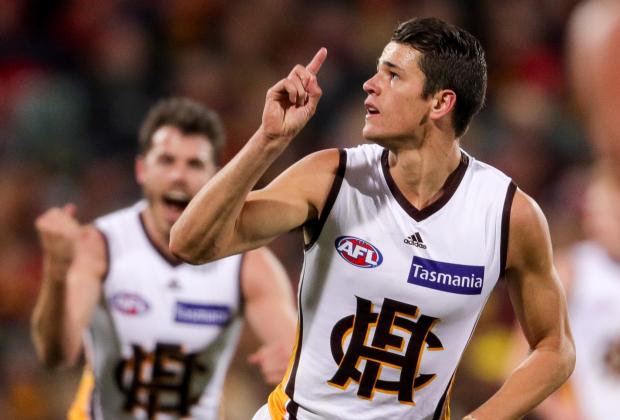THE URGING for NAB AFL Rising Star judges to factor in Andy McGrath's and Sam Powell-Pepper's feats as first-year footballers is set to fall on deaf ears.
McGrath, Essendon's first-ever No.1 draft pick last year, made a late and significant bid to be this year's winner when he kept Adelaide superstar Eddie Betts goalless on Saturday night.
The 19-year-old rounded out his performance with 25 disposals, while Port Adelaide gave Powell-Pepper, a fearless midfield bull, his first game off for the year on the same weekend.
But AFL talent manager and Rising Star judge Kevin Sheehan said the fact McGrath and Powell-Pepper – the two greatest threats to Hawthorn's second-year defender Ryan Burton – were rookies won't have any influence.
Read: Which retiree class is the best?
"(Giving a player credit for being in their first year) is not part of the criteria at all. That's not presented to selectors as an issue they should consider," Sheehan told AFL.com.au.
"Whatever method they want to use – subjective, objective, or a combination of both – they decide from the pool of 23 who they think, in the given year, has been the best Rising Star.
"It's not about how they might end up in a year or two or three years' time … that's the brief they're given."
Players must be younger than 21 on January 1 and have played 10 games or fewer to be eligible for that season's Rising Star award. Those rules were in place from the time Nathan Buckley was the inaugural winner in 1993.
The time span, according to Sheehan, is to give key-position players and ruckmen, who typically take longer to develop, more chance to be competitive with midfielders and flankers in the award. It also offers opportunity for players who are injured in their debut season, such as 2002 winner Nick Riewoldt, the No.1 pick in 2000.
"Your option was to make it the best first-year player, but that would probably rule out tall, thinner, lighter kids and it would just be a midfielders' award," Sheehan said.
In spite of that, just seven of the 24 winners so far – Nick Holland (1995), Adam Goodes ('99), Justin Koschitzke (2001), Riewoldt ('02), Jared Rivers ('04), Daniel Talia ('12) and Jesse Hogan ('15) – were tall players.
Holland and Talia are the only footballers to claim the Rising Star in their third season, with 13 of the winners coming in their first and the other nine in their second.
The terms of the eligibility were debated many times since, but Sheehan said no "compelling" case was ever mounted for the AFL to change the course of the award's history.
Some would like to see a narrower window, such as bringing the age forward one year.
Others want a more generous time frame to enable mature-age recruits, like Michael Barlow in 2010 or Tom Stewart this year, to be in contention.
Ryan Burton's class has been on display throughout 2017. Picture: AFL Photos
McGrath told AFL.com.au after his round four nomination about the challenge first-year players face physically adapting to the elite level. The Bombers twice rested him this season.
"It's a long season for younger players in the AFL, and we're not used to it," McGrath said.
"I probably don't come right (after matches) until about Wednesday for main training. I'm constantly talking to my development coach Dan (Jordan) about how I'm travelling.
"I said to my mum I've never been sore in my upper body after a game before, but after every (AFL) game my shoulders, back and chest are all sore from the impact of bigger bodies."
The AFL Players' Association has a best first-year player award and the winner has married with the Rising Star on nine occasions since starting in 1998.
Sheehan is confident the AFL has it right with the Rising Star criteria.
"It can get thin if you made it purely a first-year player award," he said.
"They might be good, promising first-year players, but we're talking Rising Stars, which are another level up in my view."



